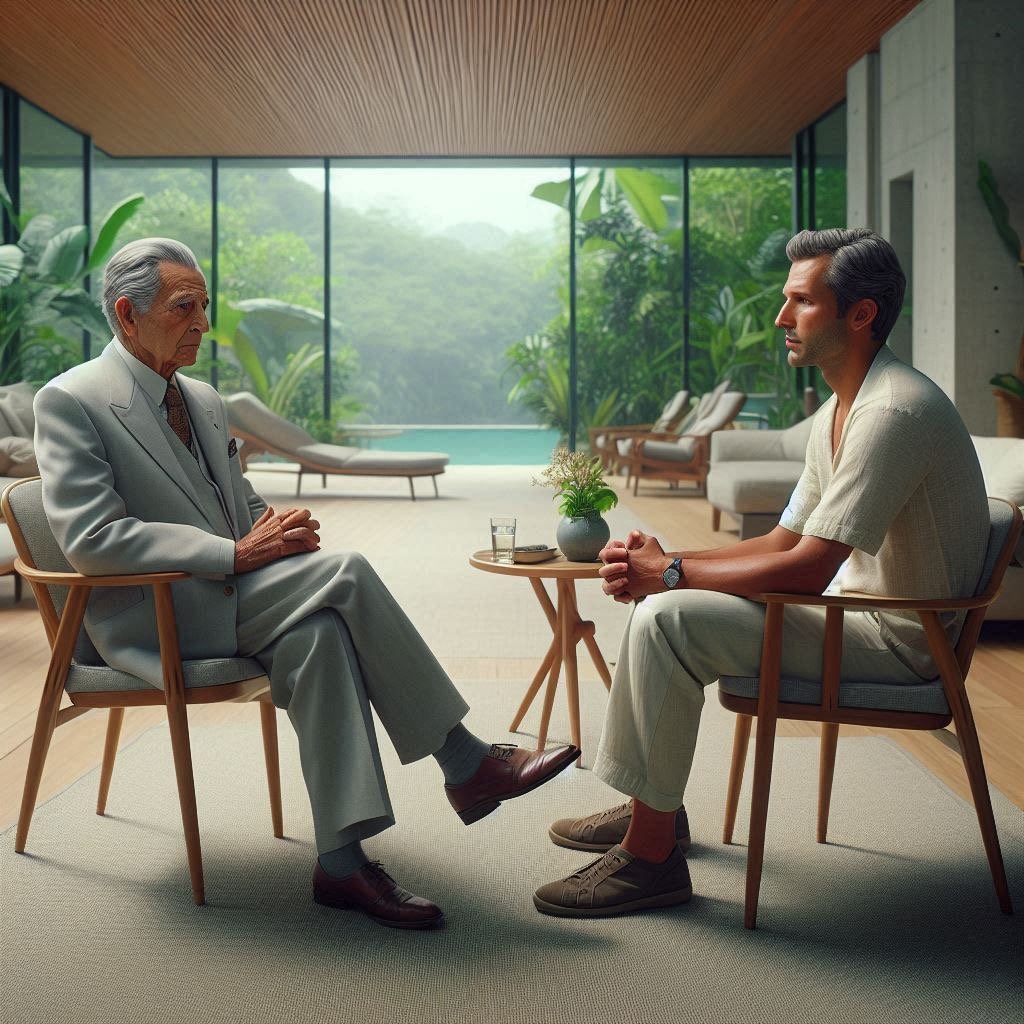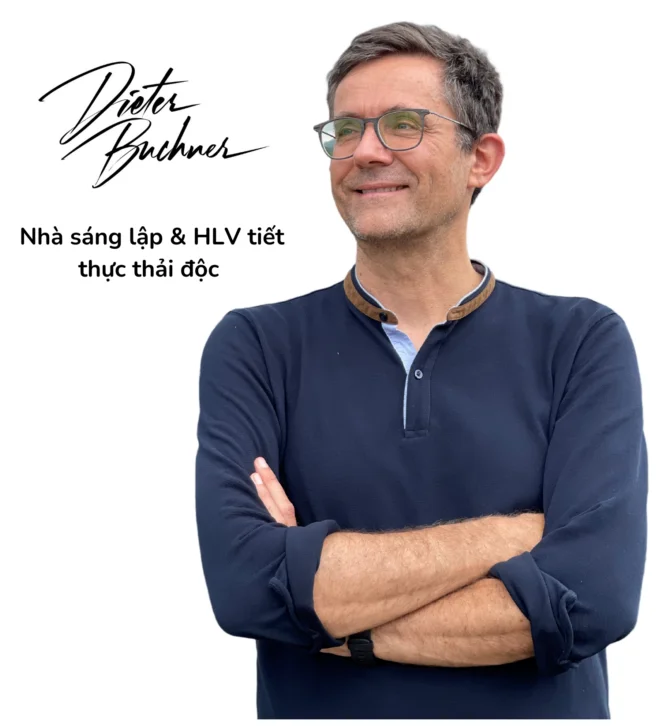
A Fictional Interview with Dr. Otto Buchinger: On Biohacking and the Modern Longevity Movement
In this imagined conversation, we explore what the pioneer of therapeutic fasting might think about today’s biohacking trends and the obsession with longevity.
Dr. Otto Buchinger (1878-1966) was a German physician who developed the Buchinger method of therapeutic fasting after experiencing its healing power firsthand when conventional medicine failed to treat his severe rheumatism. His approach emphasises the physical, spiritual, and social dimensions of healing, and his clinics continue to operate today, having treated over 250,000 patients across four generations.
Dieter Buchner is Co-Founder and Retreat Leader at Vietnam Detox, pioneering the preventative application of the Buchinger Fasting method in Vietnam since 2016. Vietnam Detox operates retreats in Hue, Hoi An, and Yen Tu, adapting traditional therapeutic fasting for modern preventative wellness.
This interview is an entirely fictional creation for educational and reflective purposes. It is inspired by published accounts, writings, and the known philosophy of Dr. Otto Buchinger, but does not represent direct statements, quotations, or personal opinions of Dr. Buchinger or his family. Any extrapolation is intended respectfully, with a focus on honouring his legacy and contributions.
Dieter Buchner (DB): Dr. Buchinger, you developed your fasting method over a century ago after experiencing its healing power firsthand. Today, we have a movement called “biohacking” where people use technology and scientific approaches to optimise their bodies. How would you view this trend?
Dr. Buchinger (OB): The desire to improve one’s health is as old as humanity itself, and I applaud any sincere effort toward healing and wellness. However, I observe both promise and concern in this “biohacking” movement. The promise lies in people taking responsibility for their own health rather than passively waiting for illness. This aligns with my belief that each person possesses innate self-healing powers that can be activated through proper conditions.
My concern, however, is that much of what I see focuses primarily on the mechanical aspects of the body; tracking metrics, optimising data points, and manipulating individual variables. During fasting, I discovered that true healing involves not just the physical dimension, but also the spiritual and emotional aspects of our being. When I wrote that “during fasting, the body thrives, but the soul hungers,” I was emphasising that we must nourish both simultaneously.
DB: Speaking of modern approaches, intermittent fasting has become extremely popular among biohackers. How does this compare to your Buchinger method?
Dr. Buchinger: I see intermittent fasting as a simplified cousin of therapeutic fasting, and while I appreciate its accessibility, I fear it may miss the deeper transformative potential. Most intermittent fasting approaches focus on eating windows and metabolic benefits- weight loss, insulin sensitivity, and autophagy activation. These are valuable outcomes, certainly, but they represent only the surface of what fasting can accomplish.
The Buchinger method encompasses what I call the three dimensions of fasting: the medical dimension, which addresses physical healing; the spiritual dimension, which involves contemplation and inner nourishment; and the interpersonal dimension, which recognises our connection to others and the world around us. Modern intermittent fasting often neglects the latter two dimensions entirely.
Furthermore, our method involves careful medical supervision, proper preparation with relief days, a fasting period with specific liquid nutrition that provides essential minerals, and, crucially, the gradual reintroduction of food after breaking the fast. This comprehensive approach ensures safety and maximises therapeutic benefits. Many people who practice intermittent fasting miss these essential elements.
DB: The longevity movement today is heavily focused on extending lifespan, sometimes referred to as “ageing backwards.” Billionaire-backed companies are investing heavily in this research. What are your thoughts on this pursuit?
OB: I lived to 88 years, and fasting regularly throughout my life undoubtedly contributed to my longevity and vitality. However, I caution against making lifespan extension the primary goal. The question is not merely how long we live, but how fully we live.
I observed, over the course of my decades of clinical practice, that patients seeking only to lose weight or extend their years often missed the profound transformations that fasting could offer. Those who approached it with an open mind to spiritual growth and self-discovery frequently experienced healing that went far beyond their physical symptoms.
Today’s longevity research seems to view ageing as an engineering problem to be solved through technological intervention. While I appreciate the scientific rigour, our own clinics now collaborate with universities and conduct extensive research. This mechanistic approach may overlook the wisdom that comes with ageing and the natural rhythms of life.
DB: Many biohackers use wearable devices and continuous monitoring. How do you view this relationship with technology in health optimisation?
OB: Technology as a tool for understanding our bodies can be valuable, much as we use medical examinations to assess patients before fasting. However, I see a danger when the monitoring becomes more important than the listening, when people trust devices more than their own inner wisdom.
During fasting, we learn to attune ourselves to subtle bodily sensations, to recognise true hunger versus habit, to feel the shift from glucose burning to ketosis without requiring a device to tell us. This internal awareness is a skill that serves us throughout life. If we become dependent on external measurement for every bodily function, we may lose touch with our innate ability to sense what we need.
I particularly worry about the obsessive tracking I observe in some biohackers. This can create anxiety and disconnection from the present moment, which is antithetical to the peaceful, accepting state that promotes healing. As I often said, fasting is fundamentally about silence, both external and internal. Constant monitoring disrupts this silence.
DB: The biohacking movement often emphasises individual optimisation and performance enhancement. How does this align with your more holistic philosophy?
OB: This represents perhaps my greatest concern about the current movement. The focus on individual performance optimisation can lead to a kind of spiritual narcissism – using the body as a machine to be perfected for personal gain rather than as a vessel for service to others and connection to the divine.
In my approach, fasting was never an end in itself but a means to develop greater sensitivity to our own needs and the needs of others. The discipline we develop through fasting should lead to greater compassion, not greater self-absorption. When our clinic in Marbella continued purchasing organic produce during the pandemic to give to those in need, this exemplified the true spirit of fasting, the willingness to share that comes from inner abundance.
I would ask modern biohackers: Are you optimising yourself to serve the world better, or simply to enhance your own performance? The motivation behind our practices determines their ultimate value.
DB: What aspects of modern biohacking do you find most promising?
OB: I am encouraged by several developments. First, the growing recognition that nutrition affects not just our physical health but also our mental and cognitive function aligns with my holistic understanding. The research into how fasting affects the brain, promotes neuroplasticity, and may help prevent neurodegenerative diseases validates what I observed clinically decades ago.
Second, I appreciate that many people are taking preventive approaches to health rather than waiting for disease. This preventive mindset was central to my philosophy of regular fasting as a way to maintain health, not just treat illness.
Third, the democratisation of health knowledge through technology means people no longer need to rely solely on medical authorities but can become active participants in their healing. This empowerment, when combined with proper guidance, can be transformative.
DB: If you were to advise someone interested in both biohacking and your traditional approach, what would you suggest?
OB: I would encourage them to begin with silence. Before adding more interventions, tracking devices, or optimisation protocols, learn to listen to your body in stillness. This is the foundation of all genuine healing.
Consider a properly supervised therapeutic fast, not merely for weight loss or metabolic benefits, but as a complete experience of body, mind, and spirit. Observe not just the physical changes but the emotional and spiritual insights that arise. This will give you a deeper understanding of your constitution than any device can provide.
Remember that true optimisation includes optimising your capacity for compassion, your ability to be present with others, your connection to nature and to something greater than yourself. Wearable devices cannot measure these qualities, but they are essential for a life well-lived.
Finally, approach any health practice with humility. The body has its own wisdom developed over millions of years of evolution. Our role is not to outsmart this wisdom but to create conditions where it can express itself most fully. Fasting taught me that sometimes the most powerful intervention is simply getting out of the way and allowing the body’s natural healing intelligence to function.
DB: Any final thoughts on where you see the intersection of traditional healing wisdom and modern biohacking heading?
OB: I believe we are at a crucial juncture where ancient wisdom and modern science can inform each other beautifully, if we proceed with reverence for both. The detailed research being conducted at our clinics today validates many observations I made decades ago, while also revealing new mechanisms and applications I never imagined.
The danger lies in losing the soul of healing practices in our enthusiasm for their mechanisms. The benefit lies in using scientific understanding to make these practices safer, more accessible, and more effective for diverse populations.
I hope the future will bring together the precision of modern biohacking with the depth of traditional healing approaches. This integration could offer people not just longer, healthier lives, but lives of greater meaning, connection, and service to others. After all, what good is an optimised body housing an impoverished soul?
